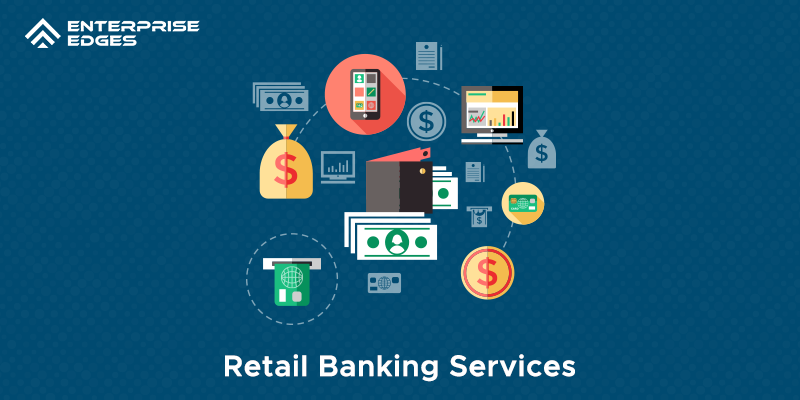A report on mobile banking payments reveals that the mobile banking payment market in India is estimated to reach a whopping one trillion USD by the year 2023, which was accounted for 6.2 Billion USD in the fiscal year 2019.
The Retail Banking Sector in India has come a long way from operating traditionally to operating on digital platforms. And this tremendous transformation is still ongoing.
What is Retail Banking?

Retail banking sectors offer financial services to individual consumers from the general public to take care of their financial proceedings. Customer’s retail banking needs are fulfilled by local bank’s branches where financial representatives offer customer service for services ranging from opening and operating accounts to availing loans, credit or debit cards, safe deposit vaults, fixed deposits, etc.
Retail Banking Services
The primary function of Retail banks is to provide savings and current accounts to customers as a secure way to deposit and store their funds and earn interest on it. The customers can avail of debit cards that allow for easy withdrawals and payments. Clients can also avail various types of loans from banks for purposes that range from funding their businesses to, buying automobiles or houses.

As for the Retail banking trends of 2021, the banks faced disruptions because of the COVID-19 pandemic. The overnight shifts in consumer behavior altered the retail banking trends unprecedentedly.
Here is the list of Top 10 retail banking industry trends:
1. Digital Transformation
An imperative trend that the Indian retail industry must embrace is amplifying digital innovation to improve user experience and regulate internal processes. Digitized product design and distribution will open a whole new world of opportunities both for the banks and the consumers. Better user experience, greater profitability, enhanced process efficiency, and faster processing to name a few.
2. AI-Enabled Personalization
The forthcoming year will witness banks taking a serious interest in AI & Machine Learning technology to drive predictive personalization as an integral part of optimized financial marketing. Advanced analytics and data will equip the retail banking industry in targeting their products and promotions to the right customers and will help drive higher sales, both in numbers and value.
3. Cybersecurity and Data Privacy

While the retail banking sectors are busy investing in digital tools, they are eventually putting themselves in an extremely responsible yet imperative position, i.e., to vouch for their customers’ privacy and data security. While incidents of security breaches and fraudulent transactions have been making waves, customers are now becoming less tolerant towards such mistakes.
Hence, cybersecurity and data privacy for web and mobile banking applications, and other digital payment channels have become the top priority for retail banks in India. This has led to a surge in investment in security solutions and Fintech companies by the retail banking industry.
4. Cloud Computing

With concerns for security and availability, cloud computing was initially sidelined by banks as compared to in-house IT infrastructure. However, the new-age banking challenges have encouraged banks to focus on Cloud computing. It can help banks optimize the processes, uplift operational efficiency to build scalable models that reduce time to market, provide superior customer experience, and much more. Banks are also focusing on the security of their cloud servers by using the latest technologies to ward off hackers and avoid data leaks.
5. Green and Sustainable Banking
Increased consumer demand for sustainability has pushed the retail banking industry to Go Green. Environmental disasters are further disrupting their already thin profit margins. Thus, various leading retail banks are taking initiatives to counter climate risks through sustainable risk management models and are developing eco-friendly operations.
Integrating environmental risks into credit offerings is a key retail banking trend. Reducing carbon footprint, using renewable energy sources, offering reduced interest rates and flexible payment options on zero-emission vehicles are a few examples of green leadership.
6. Banking-as-a- Service (BaaS)
With changing customer expectations, retail banking in India is about to see a significant change in the form of BaaS wherein banks integrate with Airlines, E-commerce, Hospitals, Logistics providers, and FinTech companies for financial offerings. With this trend, banks can monetize their data and infrastructure and also expand their market reach.
7. Workforce Transformation

Banks have started upskilling their workforce to align them with changing trends and the rise in the digital banking trend. Banks are now considering the hiring of short-term and contractual employees with diverse expertise. Even the existing workforce will be remodeled and upskilled to orient them for digital transformation and various other trends like banking with AI & ML.
8. Non-Financial Risk (NFR) Management
Strategic and operational risks like inefficient processes and human errors (HR, Data, Legal, Infrastructural, etc.) are the leading causes of significant losses. Hence, systematic approaches and stern scrutiny for practices followed by banks will be under the radar of the modern retail banking sector to mitigate the complexities of NFR.
9. Distributed Ledger Technology
DLT-based networks are also an emerging retail banking trend since it is cost effective and secure. This trend is believed to be apt for cross-border payments, trade finance transactions, and centralized digital currencies.
10. Corporate Ownership

After the recommendation by RBI’s working group on corporate ownership, the current retail banking sectors are expected to be a playground for several new players with innovative ideas. This will be marked as a new era in the Indian retail banking segment as it will enable various large and small companies, already keen on taking up the opportunity, to drive the customer experience towards the best of both worlds.
Conclusion
The unexpected challenges have caused the retail banking sector to shed its traditional models and shift to more sustainable, resilient, and agile banking innovations. These emerging retail banking trends will help the retail banks become more intelligent and evolved.
